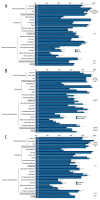Competency in ECG Interpretation Among Medical Students
- PMID: 26541993
- PMCID: PMC4638278
- DOI: 10.12659/msm.895129
Competency in ECG Interpretation Among Medical Students
Abstract
Background: Electrocardiogram (ECG) is commonly used in diagnosis of heart diseases, including many life-threatening disorders. We aimed to assess skills in ECG interpretation among Polish medical students and to analyze the determinants of these skills.
Material and methods: Undergraduates from all Polish medical schools were asked to complete a web-based survey containing 18 ECG strips. Questions concerned primary ECG parameters (rate, rhythm, and axis), emergencies, and common ECG abnormalities. Analysis was restricted to students in their clinical years (4th-6th), and students in their preclinical years (1st-3rd) were used as controls.
Results: We enrolled 536 medical students (females: n=299; 55.8%), aged 19 to 31 (23±1.6) years from all Polish medical schools. Most (72%) were in their clinical years. The overall rate of good response was better in students in years 4th-5th than those in years 1st-3rd (66% vs. 56%; p<0.0001). Competency in ECG interpretation was higher in students who reported ECG self-learning (69% vs. 62%; p<0.0001) but no difference was found between students who attended or did not attend regular ECG classes (66% vs. 66%; p=0.99). On multivariable analysis (p<0.0001), being in clinical years (OR: 2.45 [1.35-4.46] and self-learning (OR: 2.44 [1.46-4.08]) determined competency in ECG interpretation.
Conclusions: Polish medical students in their clinical years have a good level of competency in interpreting the primary ECG parameters, but their ability to recognize ECG signs of emergencies and common heart abnormalities is low. ECG interpretation skills are determined by self-education but not by attendance at regular ECG classes. Our results indicate qualitative and quantitative deficiencies in teaching ECG interpretation at medical schools.
Figures


References
-
- Hurst JW. The interpretation of electrocardiograms: pretense or a well-developed skill? Cardiol Clin. 2006;24(3):305–7. - PubMed
-
- Fisch C. Evolution of the clinical electrocardiogram. J Am Coll Cardiol. 1989;14(5):1127–38. - PubMed
-
- Kadish AH, Buxton AE, Kennedy HL, et al. ACC/AHA clinical competence statement on electrocardiography and ambulatory electrocardiography: A report of the ACC/AHA/ACP-ASIM task force on clinical competence. Circulation. 2001;104(25):3169–78. - PubMed
-
- Steg PG, James SK, Atar D, et al. ESC Guidelines for the management of acute myocardial infarction in patients presenting with ST-segment elevation. Eur Heart J. 2012;33(20):2569–619. - PubMed
-
- Deakin CD, Nolan JP, Soar J, et al. European Resuscitation Council Guidelines for Resuscitation 2010 Section 4. Adult advanced life support. Resuscitation. 2010;81(10):1305–52. - PubMed
MeSH terms
LinkOut - more resources
Full Text Sources
Medical

